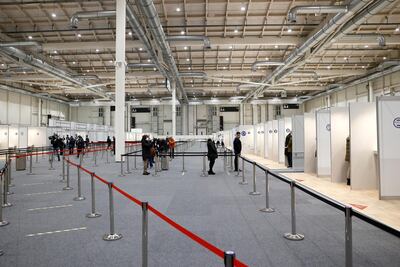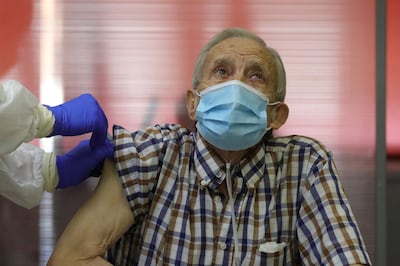European Union countries are adopting imaginative solutions to help deliver the Covid-19 vaccine as the continent plans to protect its nearly 450 million residents from the virus.
Italy's central piazzas will become inoculation centres with pop-up clinics becoming commonplace in town squares.
Scores of specially-fitted vans in Germany will deliver the vaccine to care homes, while the nation will rely on large 'vaccinodromes' to help immunise the general population.
The UK, which recently left the EU, has called upon major sporting venues such as racecourses to support vaccination efforts.
France has eased rules over how doses are delivered to its people in a country where anti-vaccine sentiments are prominent.
The EU has lagged behind countries such as the US and UK in its delivery programme. The drug regulator in Brussels took longer to approve a first vaccine for the Pfizer/BioNTech vaccine quickly. For instance, the Netherland only vaccinated its first person on Wednesday despite the drug arriving in the country on December 27.
The European Commission, which has signed deals with six vaccine manufacturers for two billion doses, has been blamed by some for the delay. Some claim it did not buy enough doses of the Pfizer/BioNTech vaccine, the first to be approved by Brussels’ regulators – although the EU’s executive branch denied this.
“I don't think that the issue is really the number of vaccines, it is the fact that we are at the beginning of a roll-out,” the commission’s spokesman Eric Mamer said. “We're all judging this as if this campaign is over; in fact, the campaign is just starting.”
While the UK approved the Pfizer/BioNTech inoculation on December 2 and the US on December 11, the EU did so on December 21.
The US authorised the Moderna vaccine on December 19 – the EU did so on January 6 – and the UK approved the Oxford/AstraZeneca product on December 30.
Plans for a co-ordinated EU-wide distribution fell apart, with individual countries left in charge of how they organise and administer the vaccine.
Those in nursing homes and medical centres were prioritised initially but as delivery of the vaccine becomes more widespread, member states have to come up with creative plans to inoculate their populations on a larger scale.
Germany
Health Minister Jens Spahn said on Wednesday that everyone in Germany will be vaccinated by the summer – if the EU approves further vaccines beyond the Pfizer/BioNTech and Moderna.
The Pfizer/BioNTech drug has already been given to more than 300,000 people, and 1.3 million doses have already been delivered throughout Germany. The country plans to open a series of ‘vaccinodromes,’ which will act as major vaccination centres to administer the drug quickly to as many people as possible.
Berlin’s Tegel airport, which closed to passenger traffic in November 2020 and was once one of Europe’s busiest transport links, will become one of the vaccination centres, as will the grounds for the city’s trade fairs.
Dozens of mini-vans will deliver the vaccines to care homes, the vehicles designed to store vials at the minus 70°C temperature the Pfizer/BioNTech drug requires. The operation has not been seamless, however, after around 1,000 doses were kept too warm in transit.
"When reading the temperature loggers that were enclosed in the cool boxes, doubts arose about the compliance with the cold chain requirements,” said the Bavarian district of Lichtenfels.
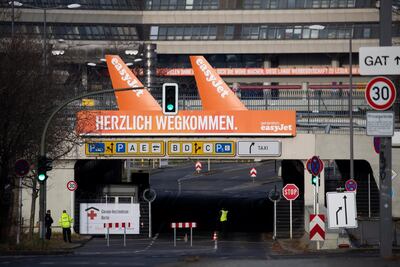
Italy
The initial European epicentre of the virus, Italy has been comparatively efficient in delivering the vaccine although there are disparities across the country.
Architect Stefano Boeri is responsible for designing about 1,500 temporary pavilions that will serve as vaccination centres in the country’s piazzas (town squares).
With a wooden interior and a primrose motif on the outside of the roof, he said idea was to "convey a symbol of serenity and regeneration".
"Italy's public life is in our piazzas. We need to make sure that these pavilions will be reachable, comfortable and places that the community consider, for a period of time, part of their lives in order to defeat Covid-19,” he said.
Italy will also invest in local biotech company ReiThera to support vaccine development.
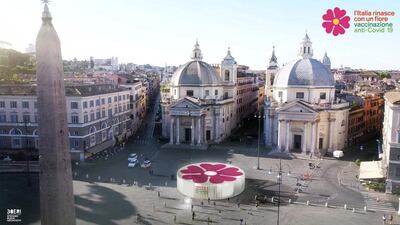
UK
No longer a member of the EU, the UK became the first country in the world to approve a vaccine in early December and has already given it to 1.3 million critical workers, nurses and members of its elderly population.
Amid government plans to vaccinate 14 million people by February, supermarket chain Morrisons has been recruited.
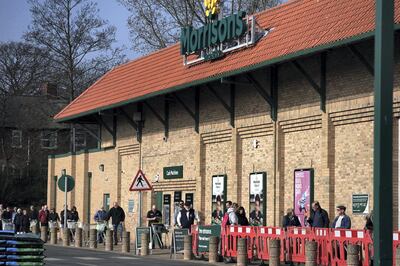
From Monday, the car parks of three stores will be used for inoculations, with another 47 offered by the grocery chain as and when they are required.
Community venues such as village halls will also be converted into clinics, as will larger buildings such as sports stadiums and conference centres.
Seven mass vaccination centres will open next week, including Manchester's Etihad Tennis Centre and London's ExCeL, an exhibition space. Premier League football teams Tottenham Hotspur and Aston Villa have offered their grounds, as have the owners of Epsom and Leicester race courses.
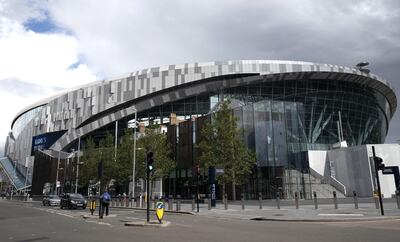
Netherlands
Often depicted as organised and focused on detail, the Netherlands has been heavily criticised for its slow response. It started vaccinating on Wednesday, becoming the EU's last member state to do so.
Prime Minister Mark Rutte said the government focused on preparing for the Oxford/AstraZeneca vaccine, which is easier to store than its competitors but has yet to be cleared for use by the EU.
It took delivery of thousands of doses of the Pfizer/BioNTech drug in late December, but is still finalising plans distribution plans.
Health Minister Hugo de Jong said the government had “proved insufficiently agile to accommodate quickly enough the changes that have occurred".
"Perhaps that could and should have been done differently,” he said.
The delay was also blamed on issues surrounding an IT system, which was to ensure people receive the correct dose.
Geert Wilders, the controversial leader of the country’s largest opposition party, described the Netherlands as “the village idiot of Europe”.
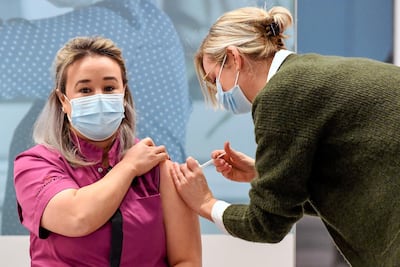
France
France has also been slow to respond compared to other EU states, with only several thousand vaccinated in a country where anti-vaxxers are widespread.
Polls have suggested more than 50 per cent would be unwilling to be vaccinated.
The government pledged to ramp up efforts and hundreds of vaccination centres will open next week. Rules demanding that only a medic or a nurse under direct supervision of a doctor inject the drug will be relaxed.
“I’m sorry to see we’re so late and we haven’t been able to vaccinate the people most at risk,” said Catherine Hill, an epidemiologist at the Gustave Roussy institute in Paris. “French bureaucracy is definitely at the root of this delay,” she told Reuters.
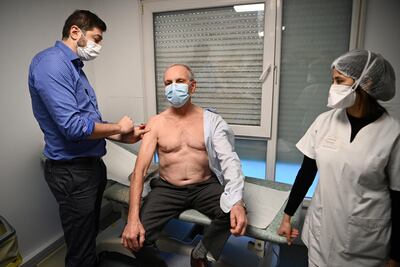
Spain
Another country that was among the hardest hit by Covid-19, health officials in Spain have admitted the vaccine strategy has been a slow process.
Many regions did not administer any doses until January 1 and there was a shortage of medical workers over the Christmas holidays.











